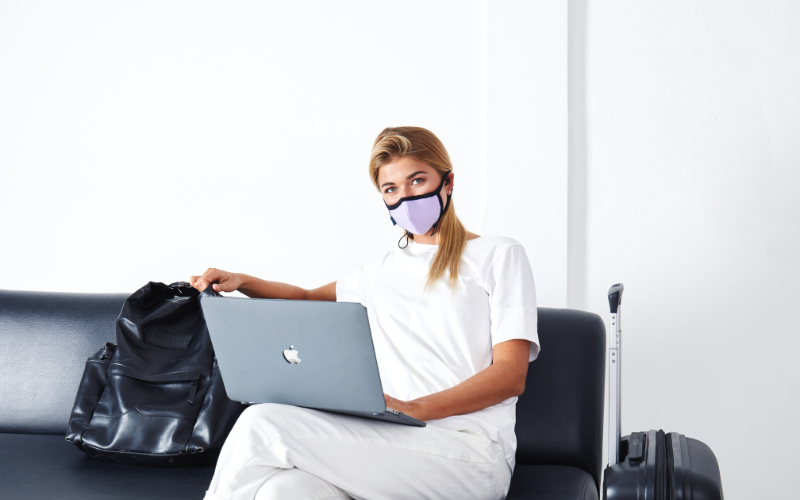
Understanding the Link Between Air Quality and Allergies
Air quality plays a crucial role in our overall health and well-being, and its impact on allergies is significant. Breathing clean air is not only essential for our respiratory system but also vital for minimizing allergy symptoms. In this blog, we'll explore the link between air quality and allergies, the importance of clean air, how poor air quality can worsen allergies, and practical ways to ensure cleaner air in your environment. We'll also provide tips on protecting yourself when air quality and seasonal allergens are high, including choosing the right face mask from the Cambridge Mask Co range.

The Link Between Air Quality and Allergies
Allergies occur when your immune system reacts to substances in the environment, such as pollen, dust, mold spores, or pet dander. Poor air quality exacerbates these reactions, leading to increased allergy symptoms. Air pollutants, such as particulate matter (PM2.5), ozone, and nitrogen dioxide, can irritate the respiratory tract and make the body more sensitive to allergens. This can result in symptoms like sneezing, coughing, runny nose, and itchy eyes.
How Pollutants Affect Allergies
Air pollutants, such as vehicle emissions, industrial discharges, and even household chemicals, can mix with allergens in the air. This combination can lead to more severe and prolonged allergy symptoms. Pollutants can cause inflammation in the respiratory system, which makes it easier for allergens to trigger allergic reactions. Studies have shown that individuals exposed to high levels of air pollution are more likely to develop respiratory issues and allergies.
The Role of Pollen and Mold
Pollen and mold spores are common allergens that can be heavily influenced by air quality. During peak pollen seasons, poor air quality can make allergy symptoms worse. Similarly, high humidity and poor indoor air quality can promote mold growth, leading to increased exposure and heightened allergic reactions.
The Importance of Breathing Clean Air
Clean air is vital for maintaining good health. It helps reduce the risk of respiratory infections, improves lung function, and enhances overall quality of life. For individuals with allergies, breathing clean air means fewer triggers and milder symptoms. Ensuring that the air you breathe is free from pollutants and allergens is a proactive step towards better health and comfort.
Health Benefits of Clean Air
- Reduced Respiratory Issues: Clean air reduces the risk of developing respiratory diseases like asthma and bronchitis.
- Better Immune Function: With fewer pollutants to battle, your immune system can focus on other health threats.
- Improved Sleep Quality: Cleaner air leads to better breathing, which can enhance sleep quality and reduce sleep-related issues.
- Enhanced Cognitive Function: Breathing clean air has been linked to better cognitive function and reduced risk of cognitive decline.
The Effects of Poor Air Quality on Allergies
When air quality is poor, allergens and pollutants can combine to create a perfect storm for allergy sufferers. Here’s how poor air quality can increase allergy symptoms:
Inflammation and Irritation
Pollutants can cause inflammation in the respiratory tract, making it easier for allergens to cause irritation. This can lead to more severe allergic reactions, including asthma attacks in those who are susceptible. Inflammation can also make the respiratory system more sensitive to other irritants, leading to a cycle of worsening symptoms.
Increased Sensitivity to Allergens
Continuous exposure to polluted air can make your immune system more sensitive to allergens. This heightened sensitivity means that even small amounts of pollen, dust, or mold can trigger significant allergic reactions. Over time, this can lead to chronic allergy symptoms that are difficult to manage.

Respiratory Issues
Pollutants like ozone and PM2.5 can exacerbate respiratory conditions like asthma, which often go hand-in-hand with allergies. Poor air quality can lead to more frequent and severe asthma attacks, making it essential for individuals with asthma and allergies to monitor air quality closely.
Long-Term Health Effects
Prolonged exposure to poor air quality can lead to chronic respiratory diseases, further complicating allergy management. Long-term health effects of poor air quality include increased risk of developing cardiovascular diseases, reduced lung function, and even premature death.
Ensuring Clean Air in Your Environment
To minimize allergy symptoms and improve air quality, consider these tips:
Use Air Purifiers
Invest in a high-quality air purifier with a HEPA filter to trap airborne particles like pollen, dust mites, and pet dander.
Maintain Cleanliness
Regularly vacuum with a HEPA-filter vacuum, dust with damp cloths, and wash bedding frequently in hot water to reduce allergens.
Control Humidity
Keep indoor humidity levels between 30-50% using dehumidifiers and air conditioners to prevent mold growth and dust mites.
Ventilate Properly
Use exhaust fans and open windows when outdoor air quality is good. Avoid using strong chemical cleaners and scented products that add to indoor air pollution.
Choose the Right Face Mask
During poor air quality or high allergen periods, wear a mask from the Cambridge Mask Co range to filter out pollutants and allergens.
Protecting Yourself When Air Quality and Seasonal Allergens Are High
During periods of poor air quality or high allergens, additional precautions are essential:
Stay Indoors
Limit outdoor activities, especially on days with high pollen counts or pollution levels. Opt for early morning or late evening outings when pollen counts are lower.
Monitor Air Quality
Use air quality apps like AirVisual or AQI to stay informed and plan your activities accordingly.
Wear a Mask
Choose a mask from the Cambridge Mask Co range. These masks effectively filter pollutants and allergens. Look for masks that fit snugly and have adjustable straps.
Keep Windows Closed
During high pollen seasons or poor air quality periods, keep windows and doors closed to prevent allergens and pollutants from entering your home.
Shower and Change Clothes
After being outdoors, shower and change clothes to remove pollen and allergens that may have settled on your skin and clothing.
Use Allergy Medications
Consider over-the-counter or prescription allergy medications to manage symptoms. Consult your healthcare provider for the best options for your needs.
By following these steps, you can protect yourself and reduce allergy symptoms when air quality and allergens are at their worst.
Choosing the Right Face Mask from Cambridge Mask Co
Cambridge Mask Co offers various masks to suit different needs and preferences. Here’s what to look for:
Filtration Efficiency
Ensure the mask has high filtration efficiency, capable of blocking particles as small as PM2.5. Cambridge Mask Co masks are designed to filter out up to 99.6% of particles, providing robust protection against pollutants and allergens.
Comfort and Fit
Choose a mask that fits snugly and comfortably. Adjustable straps and nose clips can help achieve a better fit, ensuring that the mask stays in place and provides effective filtration. Look for masks made from breathable materials to enhance comfort, especially during extended wear.
Breathability
Look for masks that provide good airflow while still maintaining high filtration levels. Cambridge Mask Co masks are designed to balance breathability and protection, making them suitable for various activities, from daily commutes to outdoor sports.
Certification
Opt for masks that meet relevant safety standards, such as N99 or N95, for maximum protection. Cambridge Mask Co masks are tested to meet international standards, ensuring you receive a high-quality product you can trust.
Conclusion
Understanding the link between air quality and allergies is essential for managing and reducing allergy symptoms. By prioritizing clean air in your environment and taking proactive steps during high-pollution and high-allergen periods, you can significantly improve your quality of life. Invest in reliable air purifiers, maintain cleanliness, control humidity, ventilate your home, and choose the right face mask from the Cambridge Mask Co range to protect yourself and breathe easier. Remember, clean air is not just a luxury—it’s a necessity for better health and well-being.


